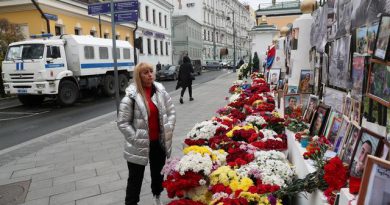OPINION: The Mood of Reconciliation in the Middle-East
A mood of reconciliation is developing throughout the Middle East. Four main regional actors—Saudi Arabia vs. Iran and Egypt vs. Turkey—have agreed to bury the hatchet and start again.
There have been shuttle diplomatic tours over the past period in the Middle East to mend relations between the region’s longtime arch-foes Saudi Arabia vs Iran, Egypt vs Turkey. Egypt and Turkey have been locked in a nearly one-decade feud over Turkey’s sympathy with and support for the Muslim Brotherhood and late President Mohammed Morsi.
The ideological congruence between the Turkish AKP-led government and the Muslim Brotherhood has always aroused sensitivities in Egypt, particularly after ousting the Muslim Brotherhood government in July 2013 following mass protests.
The problem between Egypt and Turkey is essentially one of security. Dissidents of Egypt’s regime are being hosted and protected by Turkey. It also has ideological ties to the Muslim Brotherhood, the Egyptian government’s arch-foe.
Yet, it plays a key supporting role for the Tripoli-based National Accord Government, which competes with the Libyan National Army. This significant Turkish security presence, which appeared to be a thorn in Egypt’s side, necessitated lengthy security talks before beginning any diplomatic meetings in order to test the waters and determine whether there was a prospect of changing the current approach to each other.
Following these meetings between senior security and intelligence officials from both countries, media outlets in both countries were directed to tone down their rhetoric, abstaining from insulting the leaders of both countries.
The Qatar 2022 World Cup opening game was the pinnacle of these efforts, with Qatar’s Emir Sheikh Hamad bin Khalifa Al Thani, Egypt’s president Abdel-Fattah El-Sisi, and Turkey’s Recep Tayyip Erdoğan shaking hands and declaring the end of a decade-long standoff.
Egypt-Turkey ties have been the subject of lengthy talks at the security levels between the two countries’ competent officials. The signature of a maritime border demarcation agreement with Greece in August 2020, taking into consideration the Turkish navy’s requests, was the first major step toward easing and ending the diplomatic split between the two sides. Yet, in February 2021, Egypt launched a bid for gas exploration, pledging not to infringe on the Turkish continental shelf.
According to analysts, there has always been a desire to strengthen economic relations. Given that there are motivations to toss a stone into the still pond, all indications show that proper conditions were being created to accomplish rapprochement. There’s a Turkish desire to enhance ties with Egypt in energy projects, the experts added, citing the Ukrainian crisis and the concerns it raised about the shortage in gas supplies, not to mention the two countries’ desire to restore ties to cope with the developments on the regional and global arenas.
The Turkish presence in Libya, its support for the Muslim Brotherhood-affiliated dissenters and the differences over Mediterranean gas shares were the three main obstacles to restoring the diplomatic relations. Turkey has started doing its part and taking tangible steps to bring to a halt the diplomatic breakup with Egypt and improve the strained ties.
Ankara has restricted the Muslim Brotherhood’s mouthpieces—which have been launching fierce propaganda campaigns against President Abdel-Fattah El-Sisi’s regime, playing on economic grievances—ordering them to shut down.
Over the past two decades, Iran’s role in the Middle East has been expanding—with proxy actors spreading and nearly occupying four Arab capitals—Damascus, Beirut, Baghdad and Sana. To Iran, Saudi Arabia is on the opposing side. Saudi Arabia is a major Sunni Arab nation and home to Muslims’ two holiest mosques. It never supports militias or non-state actors. It has no troops deployed overseas. It has no IRGC or Qassem Soleimani. Thus, the political agendas adopted by Saudi Arabia and Iran are diametrically opposed.
As for Iran and Saudi Arabia, the way the shift happened wasn’t so much different from that of Egypt and Turkey. Saudi Arabia and Iran have always been at loggerheads—but the tensions on the surface have always been a tip of the iceberg. The breaking point came when Iranian protesters had breached the Saudi embassy in Tehran and its consulate in Najaf following Riyadh’s execution of Saudi Shiite cleric Nimr al-Nimr in 2016, a point at which the relationship between the two countries was severed. This diplomatic breakup was followed by a streak of estrangement and proxy war.
Negotiations were resumed in April 2021 in Baghdad. The two sides held unannounced meetings in Baghdad’s Green Zone. They held five rounds of talks, the last of which was held in April 2022. These rounds of talks yielded limited results.
These rounds of talks were characterized by secretiveness. According to Iran’s foreign ministry spokesman Saeed Khatibzadeh, an agreement with Saudi Arabia stipulates that the details of the talks should never be revealed. There has been deep divergence between the two sides. This was indicated by the slow and prolonged talks between the two sides—with the intervals between the rounds of talks—particularly the fourth and fifth rounds—extending to seven months.
The internal and regional developments that accompanied these talks weren’t stable. In Iran, President Ebrahim Raisi took power following a controversial presidential contest marked by voter apathy. The reign of Mostafa al-Kadhimi ended and his successor Mohammed Shaya al-Sudani took office and took over the coordination of the talks. Some even argue that the Saudi-Iranian rapport’s seed was soon in Iraq, as there has been rapprochement between Riyadh and Baghdad since al-Kadhimi took power.
Thus, there are similarities shared by the talks between Egypt and Turkey on the one hand and Iran and Saudi Arabia on the other. Both Egypt and Saudi Arabia are concerned with the security issues, since Iran and Turkey have been nurturing an increasing deployment in the Middle East and beyond, using non-state actors and ideology-infused groups. The Muslim Brotherhood’s ideology—globalist Islam, establishing the caliphate and, to some extent, restoring the now-fading Ottoman glory—is Turkey’s asset. Meanwhile, Iran’s asset is militias indoctrinated by the ideology of Velayat-e Faqih who seek to establish the Shiite version of the globalist Islam. Ironically, Iran has strong ties with the Muslim Brotherhood, too.
Another similarity is the climb-down, or concessions made by Turkey and Iran in order to mend relations with Egypt and Saudi Arabia. To promote its political project, Iran has traditionally relied on militancy and proxy actors. Despite sanctions and severe pressures, it has continued with this political project. However, when the sanctions hurt the country’s economy and the regime’s legitimacy at home as well as its credibility among Shiites, the regime was forced to back down, taking several steps back and sitting down with its archrival Saudi Arabia to end the decades-long rivalry. Similarly, Turkey’s Erdoan has always opposed normalizing relations with Egypt’s regime, claiming that he would never shake hands with someone like El-Sisi—but he climbed down and did it.
The bottom line: A mood of reconciliation is developing throughout the Middle East. Four main regional actors—Saudi Arabia vs. Iran and Egypt vs. Turkey—have agreed to bury the hatchet and start again. The talks were slow and laborious. Concerns about security have taken precedence over political issues. There are stronger parties and those that have made concessions. Yet, the newly reconciled nations haven’t fully restored ties, allowing each other time to test their intentions and see if each side would follow through on what was agreed upon. As a result, a significant step has been accomplished, yet there is still a mountain to climb.
Mostapha Hassan Abdelwahab is the former editorial manager of the English edition of the Baghdad Post. He is focusing on Iraq, Iran and political Islam movements, with articles posted on the Herald Report, Vocal Europe, the Greater Middle East and other platforms.
Disclaimer: Views expressed by writers in this section are their own and do not reflect Milli Chronicle’s point-of-view.



